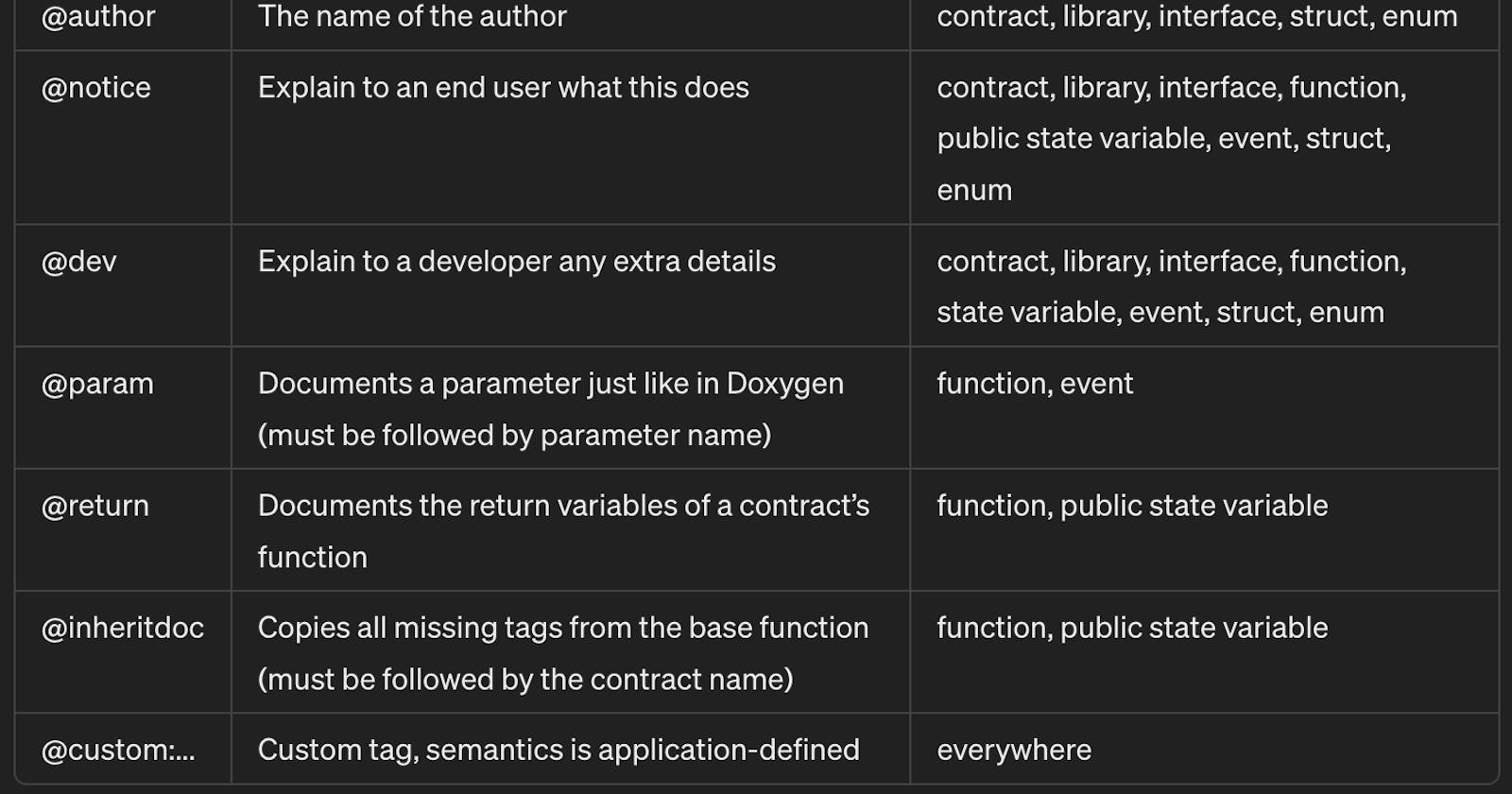Solidity special comments: NatSpec documentation format
The key to code readability and maintainability
Introduction
Solidity, the programming language of the Ethereum blockchain, offers a unique feature known as the Ethereum Natural Language Specification Format (NatSpec). NatSpec allows developers to include rich documentation within their smart contracts, facilitating better understanding for both developers and end-users.
Understanding NatSpec
It employs special comment formats recognized by the Solidity compiler, enabling developers to annotate their contracts comprehensively. These annotations serve two primary purposes: developer-focused messages and end-user-facing messages.
Developer-Focused Messages
For developers, NatSpec provides insights into contract behavior, implementation details, and other relevant information crucial for understanding and modifying the contract code. These messages are typically embedded using tags like @dev, @param, and @return.
End-User-Facing Messages
End-users interact with smart contracts through transactions and need to understand the contract’s functionality and limitations. NatSpec enables developers to provide clear explanations using tags like @notice and @title.
Where can we add NatSpec Comments?
NatSpec comments serve as a means to document different elements of Solidity code, such as:
Contracts: Describing the overarching purpose and functionality of a contract.
Functions: Detailing the inputs, outputs, and intended behavior of a function.
Events: Specifying the parameters and expected actions of an event.
Modifiers: Clarifying the actions and impact of a modifier.
Public state variables: Providing insights into public state variables.
Here’s an example of a Solidity contract with NatSpec comments:
// SPDX-License-Identifier: MIT
pragma solidity ^0.8.24;
/**
* @title ERC20 Token contract
* @notice You can use this contract to mint, transfer, aprrove tokens
* @dev This contract implements the ERC20 standard for fungible tokens.
*/
contract ERC20 {
/**
* @notice The total supply of tokens in circulation
*/
uint256 public totalSupply;
string public name;
string public symbol;
uint8 public decimals;
mapping(address => uint256) public balanceOf;
/**
* @notice A nested mapping representing allowances granted by token owners to spenders
* @dev The first address represents the owner, the second represents the spender
*/
mapping(address => mapping(address => uint256)) public allowance;
/**
* @notice An event emitted when tokens are transferred from one address to another
* @param from The address from which tokens are transferred
* @param to The address to which tokens are transferred
* @param value The amount of tokens transferred
*/
event Transfer(address indexed from, address indexed to, uint256 value);
event Approval(
address indexed owner, address indexed spender, uint256 value
);
/**
* @notice Constructor to initialize the token parameters
* @param _name The name of the token
* @param _symbol The symbol of the token
* @param _decimals The number of decimals the token uses
*/
constructor(string memory _name, string memory _symbol, uint8 _decimals) {
name = _name;
symbol = _symbol;
decimals = _decimals;
}
/**
* @notice Transfers tokens from sender to recipient
* @param recipient The address receiving the tokens
* @param amount The amount of tokens to transfer
* @return A boolean indicating success of the transfer
* @dev Throws if the sender's balance is insufficient.
*/
function transfer(address recipient, uint256 amount)
external
returns (bool)
{
require(balanceOf[msg.sender] >= amount, "Insufficient balance");
balanceOf[msg.sender] -= amount;
balanceOf[recipient] += amount;
emit Transfer(msg.sender, recipient, amount);
return true;
}
/**
* @notice Approves spender to spend tokens on behalf of the owner
* @param spender The address allowed to spend the tokens
* @param amount The amount of tokens allowed to spend
* @return A boolean indicating success of the approval
* @dev Throws if the sender is not the token owner.
*/
function approve(address spender, uint256 amount) external returns (bool) {
allowance[msg.sender][spender] = amount;
emit Approval(msg.sender, spender, amount);
return true;
}
/**
* @notice Mints new tokens and adds them to the specified address
* @param to The address to which new tokens are minted
* @param amount The amount of tokens to mint
* @dev function to mint new tokens and update total supply. Throws if the total supply exceeds the maximum value for a uint256.
*/
function mint(address to, uint256 amount) external {
require(totalSupply + amount >= totalSupply, "Total supply overflow");
balanceOf[to] += amount;
totalSupply += amount;
emit Transfer(address(0), to, amount);
}
}
Tagging Guidance
Each tag serves a distinct purpose and is not mandatory. Below is a breakdown of the NatSpec tags and their respective purposes and usage contexts.

Ethereum Natural Specification Format tags
Generating Documentation
solidity-docgenis a program that extracts documentation for a Solidity project.
Steps to generate a documentation:
Install solidity-docgen from npm.
npm install solidity-docgen
Include the plugin in your Hardhat configuration.
// hardhat.config.ts
import 'solidity-docgen';
export default {
docgen: { ... }, // if necessary to customize config
};
Then run with hardhat docgen
npx hardhat docgen
